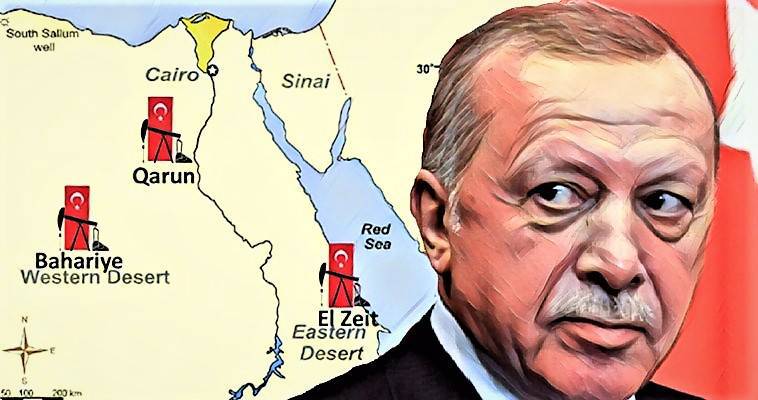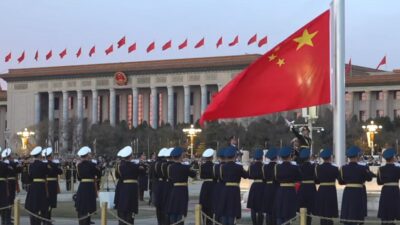Giorgos Adalis: Ankara’s long reach on Egyptian oil
18/06/2020
In a previous article, we had revealed that, at least 15 years ago, Turkey had set a goal of invading Libya. Since 2005, it has acquired three oil wells after tenders. Thus, Turkey’s involvement in Libya does not begin with the illegal Turkish-Libyan memorandum between Sarraj and Erdogan. Libya’s gates are open to Ankara, and Turkey opened them under the mantle investments.
Is this an individual strategy of Erdogan who wants to conquer Libya and turn it into an satellite state for energy purposes or are we talking about something much greater? Turkey, since the time of Kemal Ataturk, has been pursuing a unified policy and has only one strategy in the field of energy. That is why the Turkish State Oil Company (TPAO) was founded in 1957 under Law 6327, as the ultimate hydrocarbon manager. Kemal Ataturk first focused on hydrocarbons, in the early 1920s, when he began talking about oil in the “vilayet of Kirkuk”.
The oil fields that Turkey gained in Libya in the years 2005-2010.
Apparently, Turkey has managed to have a presence in the country’s three major oil basins. In seven of the eleven wells TPAO drilled, it struck oil. Turkey’s decision to temporarily suspend drilling and exploration there in 2013 was essentially a legal game that allowed it –at no cost– to maintain a strong presence in the country. A presence that may not have earned income from “black gold” but allowed it a continued numerous presence there.
From entrepreneurs to scientists lobbied cultivating the “ground” so the Muslim local population would, maybe, see the Turkish army as a a protector, being of the same faith. The initial predominance of Sarraj’s forces, who, by the way, is of Turkish descent, is a representative example of this ultimate strategic goal, i.e. the transformation of Libya into a Turkish “vilayet”. Haftar’s appearance was the “centrifugal force” that threw a spanner in the works of Turkish plans. Since then, Erdogan has been strategically looking forward to two alternative scenarios.
- Either, the creation of a united Libya as a full-fledged satellite state of Turkey and the displacement of dissidents in the southern desert.
- Or, in the division of Libya, not along an East and West axis, but into Northern and Southern Libya with a military dominance of Sarraj, from Tripoli to Benghazi, to the borders of Egypt.
What is going on in Egypt?
If we look at what happened in Libya in 2019-2020, then we can very easily analyze what Turkey has done in the past in Egypt. So let’s go back several years, when Erdogan was still mayor of Istanbul. On October 31, 1994, Turkish Petroleum, through its subsidiary Turkish Petroleum International Company (TPIC), announced that it had found oil in Egypt.
Indeed, it was preceded by a permit from the then-Egyptian government for research on its territory by TPIC. It was a deposit on the west side of Egypt and specifically in west Qarun. There, in November 1994, TPIC began producing 2,500 barrels of oil per day, and soon rose to 4,000 barrels per day. Egypt’s then-energy minister, Hamdi al-Banbi, said he was pleased that the amount, from the Abu al-Garadik field and through the existing Gupco pipeline, would be channeled to the market. The Egyptians, without realizing the dangers, were essentially opening the door to Turkish designs.
In the years that followed, the Turks expanded their presence to two other Egyptian oil wells, gaining a presence in three strategic oil basins in Egypt. Thus, under Erdogan, Turkey, in addition to the Qarun field, has explored both Yabal el-Zayed, a strategic point in the Gulf of Suez, and the Bahariya Oasis, southwest of Cairo, again in a strategic area. The following map shows these three areas geographically.
A “world renown” candidate
The strategy pursued in Egypt has much in common with that pursued in Libya because after Turkey’s energy penetration into the country, an army of lobbyists followed, who promoted the “vision” of the Muslim Brotherhood. What followed is more or less known. Turkey funded the “Arab Spring” and “imposed” on Egypt the Nobel prize winner El Baradei, who from day one declared that in the Eastern Mediterranean, only Egypt and Turkey have EEZs.
At the same time in Greece, however, many media outlets were talking about the “pacifist” Baradei, and many were passionate about overthrowing the Egyptian regime giving power to El Baradei, who, in essence, was Erdogan’s “sidekick.” It is paradoxical that despite his clearly pro-Turkish sentiments, Baradei at the time was seen as a “golden boy” by the Greek ruling classes.
January 25, 2011, which went down in history as the “day of rage” in Egypt, was aimed at the downfall of Hosni Mubarak, after 30 years in power. This was achieved on February 11 when the Council of the Armed Forces announced the expulsion of Mubarak. It was preceded, of course, by the rise of Brent oil to $ 100 a barrel and the “rolling out of the carpet “ for Mohamed El Baradei following the events in Tahrir Square!
In light of the Dendias-Sisi meeting
It is very likely that if in early 2013, Egyptian Islamist cleric Mahmoud Shaban did not threaten Erdogan’s chosen El Baradei with a fatwa (religious edict), General Sisi would not have been elected in 2014 and 2018. Thus, the country would have been handed to Baradei, under the sponsorship of the UN and Erdogan. Of course, we would not be discussing the Greek and Cypriot EEZ now, as they would have been plundered by Erdogan and Baradei. What is also important is that Turkish Petroleum’s five-time award-winning executive, Hussein Cetin, has methodically managed to sell Turkey’s oil wells to Egypt at three times the value, during Egypt’s transition years.
Cetin, who studied on a TPAO scholarship and was a company board member, made some “raids” as Director of “TPAO Egypt” for over ten years, and managed to get Turkey out of Egypt with profits. That is why he was rewarded with a managerial position in 2014 in Azeri hydrocarbon giant SOCAR. While his experience in BP on soil stratification sequences allowed him to also delve in the new canal being designed by the “Sultan” in the Bosporus.
Therefore, what Erdogan is doing today in Libya is an obvious fascimile of what he did in Egypt. Of course, the policy of “lebensraum” that is pushing Turkey into such tactics does not stop in Libya and Egypt, but extends to many other countries. This is something useful to know in view of Greek foreign minister Dendia’s visit to Egypt. After all, Sisi has greatly strengthened his military presence on the Egyptian-Libyan border, because he knows very well what the Erdogan-Sarraj duo may try to do from the summer onward. Let’s hope that Mr. Nikos Dendias also knows.






